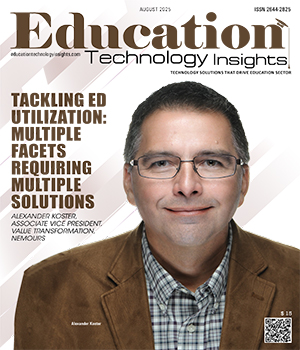THANK YOU FOR SUBSCRIBING
Be first to read the latest tech news, Industry Leader's Insights, and CIO interviews of medium and large enterprises exclusively from Education Technology Insights
Artificial Intelligence: The Ethical and Respectful Use of Indigenous Knowledge in an AI World
Te Hurinui Karaka-Clarke EdD, Head of School of Teacher Education at the University of Canterbury
 Te Hurinui Karaka-Clarke EdD, Head of School of Teacher Education at the University of Canterbury
Te Hurinui Karaka-Clarke EdD, Head of School of Teacher Education at the University of CanterburyArtificial intelligence (AI), a longstanding technological innovation, has gained significant prominence in the field of education in recent years. AI possesses the capacity to revolutionize educational practices by enabling seamless access to vast repositories of knowledge and information. While this feature offers numerous benefits to students and educators, educational institutions are currently contending with the ethical implications of AI usage.
Of particular concern is the unethical utilization of AI, a pressing issue that holds significant implications for indigenous communities striving to safeguard the sovereignty of their knowledge and cultural heritage. Such ethical dilemmas were addressed at a hui rongomau, a restorative meeting convened between iwi (tribal) and whānau (family) members and an external group. The meeting also sought to address a parallel concern involving copyright infringement, which had caused harm and offense to the affected parties.
One illustrative case presented at the hui involved the unauthorized alteration of an image depicting a Māori warrior, wherein AI technology was employed to manipulate the photograph by replacing the warrior's head with another individual's, leading to a breach of cultural practices and insult to the warrior and his descendants. The affected parties invoked indigenous principles and protocols to seek redress for the transgression.
"Of particular concern is the unethical utilization of AI, a pressing issue that holds significant implications for indigenous communities striving to safeguard the sovereignty of their knowledge and cultural heritage."
The ensuing restorative process adhered to tikanga Māori, encompassing ceremonial welcomes, speeches highlighting the harm caused by the offenders, and expressions of remorse from the transgressors. Ultimately, through an exchange of dialogue and acknowledgement of wrongdoing, the parties engaged in a customary hongi ritual, signifying a resolution to the dispute.
This narrative underscores key considerations for educators in navigating the ethical complexities of AI usage in educational settings. AI's indiscriminate accumulation of information raises pertinent questions about data sovereignty and cultural sensitivity, particularly for indigenous communities advocating for the protection of their knowledge. In aligning with indigenous principles of data sovereignty, educators are prompted to exercise caution when employing AI technologies and to prioritize ethical considerations in their pursuit of information.
In accordance with Tikanga Māori protocols, the selective dissemination of knowledge was observed to restrict access to certain information exclusively to designated individuals recognized by custodians of knowledge. These designated individuals were tasked with identifying successors from subsequent generations entrusted with safeguarding such knowledge for posterity. This enduring practice persists into contemporary times, where the preservation of data sovereignty amidst the proliferation of artificial intelligence can be construed as a modern iteration of this longstanding tradition.
By fostering a nuanced understanding of the ethical implications surrounding AI usage and upholding respectful engagement with diverse cultures, educators can harness the transformative potential of AI while safeguarding against unintended harm or transgressions. Prioritizing ethical awareness and informed decision-making can enable educators and students to navigate the complexities of modern technological advancements in alignment with cultural protocols, the principles of data sovereignty and the ethical and respectful use of indigenous knowledge in an AI world.
Read Also
Goldilocks Regulation
Beyond the Quiz: Redefining Competence in eLearning
Beyond Theory and Into Monday Morning: Enhancing Graduate Programs for Teachers
Safeguarding Students in the Age of Deepfakes: An Educational Imperative
Delivering Excellence in Education through Transformative School Leadership
Curriculum Innovation for Student Success and Institutional Growth

I agree We use cookies on this website to enhance your user experience. By clicking any link on this page you are giving your consent for us to set cookies. More info











